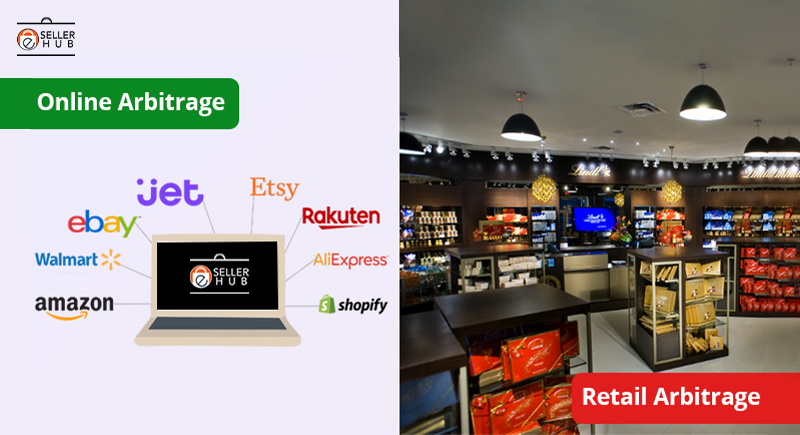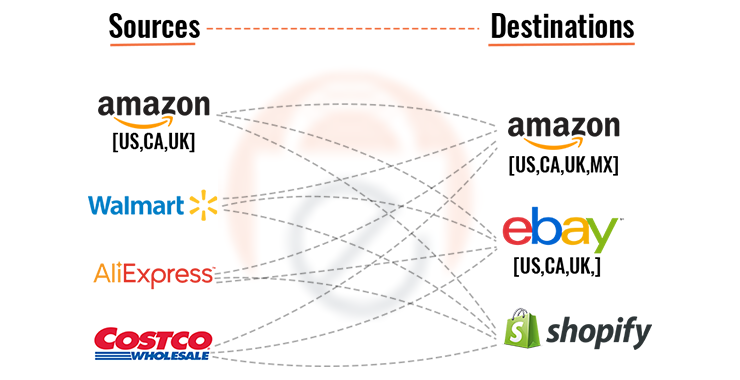The Changing Dynamics of Online Selling: Retail to Online Arbitrage
- by eSellerHub

People selling stuff not owned by them isn’t entirely a new concept. Retail arbitrage has been around for as long as the modern retail industry is in existence. To put it in an anecdote, Simon’s Grocery across the street is running a clearance sale on frozen Tuna. Tuna is 50% cheaper than everywhere else in the surrounding is. Therefore, you start selling the Tuna at a 25% discount.
Retail arbitrage has twin advantages: the seller doesn’t have to maintain his own inventory and apparently, can leverage on an existing stock, which could be at a nearby store. People into retail arbitrage visit nearby stores, find goods that are going on a discount, scan those goods, compare them to items listed on Amazon and profit on price disparity.
Retail Arbitrage is Demanding
However, retail arbitrage isn’t feasible as it was a few years age. Retail arbitrage is a demanding job with so many people competition in this arena. I know people who visit dozens of stores every day to find that perfect product. Travelling cost is a definite overhead. Another problem is it’s time consuming like anything. People who take retail arbitrage as an after hour job eventually have to make a hard choice between their day jobs and …
Retail arbitrage is an uncertain business. Even people into it for many years struggle to find the right products at the right price. People who quit their day job to be full-time retail arbitragers often suffer the same fate.
This uncertainty often leads to many people to embrace the other form of arbitrage—online arbitrage.
Online Arbitrage is Better if not the Best
Online arbitrage addresses the two biggest limitations of retail arbitrage: travelling overheads and time consumption. To understand online arbitrage, let me put another narrative. Joe lives in Anchorage, Alaska, which has freezing temperature most of the year, sparse population, limited retail stores, and, thus, no opportunity to profit on price disparity.
So he insists on online arbitrage wherein he profits on price disparity between two online marketplaces like Amazon and Walmart. Every day he curates a list of best selling products on Amazon, finds which are available at a lower rate on Walmart or any other online marketplace, and profits on price disparity.
While online arbitrage addresses two biggest problems with retail arbitrage the third problem—uncertainty—remains. When you consider everyone who has a decent internet connection and a laptop is your potential competitor, makes the space many times more competitive than retail arbitrage. Let me put it this way. Online arbitrage is a business that pays you for comparing price between online marketplaces, which business is more dearer than this.
| Retail Arbitrage | Online Arbitrage | Wholesale | Private Label | |
| Investment Cost | Low-medium | Low | Medium-high | High |
| Labeling | NA | NA | NA | Yes |
| Listing Details | Import | Import | Manual Entry | Create |
| Product Marketing | NA | NA | NA | Yes |
| Scalability | Low | Low | Medium | High |
| Profitability | Low | Medium-High | Medium-High | Medium-High |
| Overheads | Medium | Very Low | High | Very High |
| Automation | Limited | Yes | Limited | Scope specific |
When the competition skyrockets, turning a profit gets harder. Online arbitrage isn’t an exception. Without competitive edge, all you would be doing is burning your time without turning a single dollar. An increasingly number of people is insisting on online arbitrage automation solutions to beat the competition.
Are They Worth It?
What happens when everybody drives a car? Person with the fastest car wins. The problem with online arbitrage automation systems is the same. When everybody uses the same set of software tools, these tools lose their purpose and the person into the business market edge. What is speed to a car, customization is to a software solution.
Going back to the online arbitrage automation solution, everybody is using the same set of software solution. How is this different from when people were vetting best prices manually? Therefore, you need a unique solution customized to your needs and nobody develops better eCommerce solutions than eSellerHub.
Online Arbitration by eSellerHub
The software that powers your online arbitration operation needs to be built around it, not the other way around. So that you can sit and relax while our custom online arbitrage software takes care of every part of your online arbitrage business from processing orders to automating large portions of your dropshipping logics. Did I mention? Our intelligent crawlers crawl various eCommerce websites to suggest you products to list. Each crawler works on many indicators to deliver you the best listing suggestions.

A major problem with ecommerce solution is the API callback limits. If you are listing a product that is in hyper-demand, it will encounter more prices changes in the original listing. This may happen with 80% of your products at a time. Frequent changes may block API resources from the marketplace because of too much resource utilization. Therefore, we integrate resource allocators in our ecommerce solutions that limit resources to a product according to its sales velocity and volume rather.
The Online Arbitrage Software We Develop Gets Better with Time
A major advantage of our online arbitrage solutions is this that they get better with time. We integrate smart algorithms into our solutions which learn users’ intent with time. Once it gets your preferences, you will have to perform fewer manual actions and literally put your online arbitrate operation in cruise mode.
The market is overcrowded with software solutions to automate online arbitrage. However, only a few have the expertise and experience of eSellerHub when it comes to online arbitrage software. With features like auto products updates, CAPTCHA passing algorithms, browser automation and tracking number integration, you’re sure to get the much-needed competitive edge and standout in the business.
